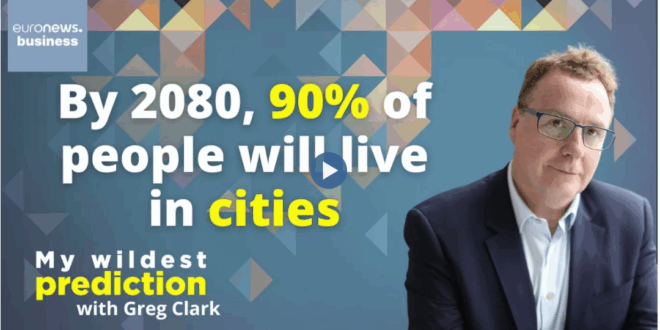Muhamad Yehia.. Cairo
According to global urbanist Greg Clark, 55 years from now, the world’s population will have peaked, and nearly all of it will be living in cities. But what challenges will this bring? And what are the possible solutions
My Wildest Prediction is a podcast series from Euronews Business where we dare to imagine the future with business and tech visionaries. In this episode, Tom Goodwin talks to Greg Clark, an expert on sustainable urban transition.
Today, around 4.4 billion people, just over half the global population, reside in urban areas.
This urbanisation trend is expected to continue in the coming years, raising important questions: How will people feed themselves? How will they navigate their cities? Will they have access to clean air and clean energy?
To address these doubts, My Wildest Prediction talks to Greg Clark, a global urbanist and advisor, who shares his thoughts on the future of cities
The numerical peak of human population
“By 2080, that’s 55 years away, there will be more than 10 billion human beings,” Clark said about his wildest prediction. “Almost 90% of us will be living in cities and in urban areas,” he added. According to Clark, the human population will have reached its numerical peak by 2080. Yet, he explained that disruptors like climate change, wars and pandemics may cause the peak to happen even earlier.
Clark believes that after the global population crosses the 10 billion mark, the world will begin to experience trends already visible in parts of the world, such as people living longer on average while having fewer children. “Eventually, the total population will stabilise, and then it will begin to decline,” he added.
Clark emphasised that population growth will require building adaptable and sustainable cities. He noted that once global numbers start to decline, there would be a need for strategies to redistribute the world population in ways that preserve the planet’s well-being
“So it’s a bit of a quest,” he added, “I think it’s a bit of a frontier of discovery
Upcoming urban challenges and solutions
Greg Clark’s prediction of an increasing urbanisation does not come without challenges. The urbanist highlighted the hidden consequences of urban concentration of population, such as inequality and environmental pollution, that are often overshadowed by the economic productivity and growth that cities drive.
“Permanent population growth and permanent economic development,” he said, “I think we have to revise all of that and start to think differently”.
Clark outlined food, housing, and transport as critical sectors that will require major innovation to accommodate growing urban populations.
cycling as signs that effective solutions are already taking shape.
“The housing and the food problems are going to take more ingenuity,” Clark noted.
He emphasised the need to transform food systems through urban farming, agri-tech, water efficiency, and synthetic food innovation, while also addressing the housing crisis by building more affordable, well-serviced homes and shifting the mindset from housing as investment to housing as an amenity.
Clark also noted that inequality in cities often leads to higher crime rates, threatening safety and eroding the overall civic experience.
“So crime and insecurity related to inequality is the thing which I think we’re going to have to work on much more than we have been,” he said.
Reconnecting Cities with Nature
Clark argued that, along with tackling urban challenges through technology and infrastructure, a lasting solution must also involve reconciling cities with the natural world.
“Nature is coming back into cities whether we like it or not,” said Clark as he stressed on integrating nature into the urban landscape, “Whether it returns as a pandemic, an infestation of rats, or something else, it’s a choice we must make”.
He highlighted the importance of developing what he called organic cities, saying that integrating nature into urban spaces could address many pressing challenges, from flooding and overheating to improving air quality.
Clark also pointed out the abundance of resources, such as timber and natural processes for water recycling and light filtration, which could make cities more sustainable. Additionally, he noted that many cities were originally designed with nature in mind, and returning to these roots could help create a better future.
“But in the end,” remarked Clark, “I think what you have to do is say, ‘this is about the future of the human race. Are we going to be able to manage and maintain our habitat in ways that will support life when we’ve gone?’”
 موقع وجه أفريقيا موقع وجه أفريقيا هو موقع مهتم بمتابعة التطورات في القارة الأفريقية
موقع وجه أفريقيا موقع وجه أفريقيا هو موقع مهتم بمتابعة التطورات في القارة الأفريقية



